 |
 |
Daily
Web Coverage
|
 XII
World Forestry Congress XII
World Forestry Congress
Québec City, Canada |
21 - 28 September 2003
|
Congress
Highlights for Wednesday, 24
September 2003
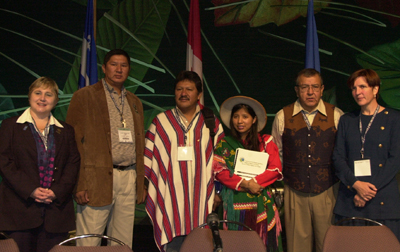 The
morning Special Session heard the results of the Youth and Indigenous
Peoples' Forest Forums, and the Plenary Session focused on the
rehabilitation of the world's forests. In the morning and afternoon,
Ecoregional roundtables discussed characteristics of, and visions and
strategies for the future of boreal, temperate, dry tropical, dry
subtropical, and subtropical and tropical humid forests. The
morning Special Session heard the results of the Youth and Indigenous
Peoples' Forest Forums, and the Plenary Session focused on the
rehabilitation of the world's forests. In the morning and afternoon,
Ecoregional roundtables discussed characteristics of, and visions and
strategies for the future of boreal, temperate, dry tropical, dry
subtropical, and subtropical and tropical humid forests.
In the afternoon, open fora addressed
participatory management, SFM, climate change and plantations. Side events
also convened in the morning, afternoon and evening.
Above
photo: The
Co-Chairs of the Indigenous Peoples Forestry Forum along with an
indigenous youth representative, present the Wendake Plan of Action,
calling for the recognition of indigenous peoples' right to
self-determination, pictured along with the chair and moderator of the
special session.
|

Linda
Mossop, Department of Water Affairs and Forestry,South Africa,
summarizing the presentations of the morning plenary.
|
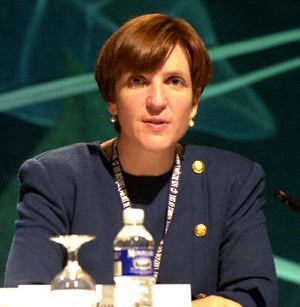
Jill Bowling, WWF,
introducing the participants of the Special Session
|
|
|
|

|
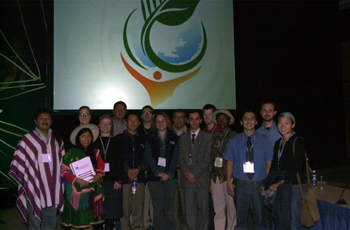
|
| Above photos (L-R): Youth representatives with the chair and
moderator of the special session; Representatives of the Indigenous
Peoples and Youth Fora pictured together after presenting their demands.
|
|
| Plenary
Session: 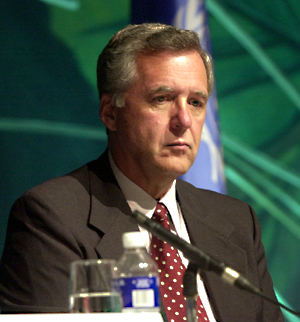
|
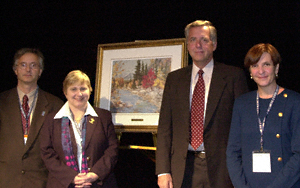 |
Above photos
(L-R): Dale Bosworth, US Department of Agriculture (USDA), Forest Service,
described changing perspectives in forest management, from resource
extraction to long-term ecosystem health; Gerard Szazar, Linda Mossop, and
Jill Bowling presenting Dale Bosworth a painting Aldo Cusan.
|
Ecoregional
Sessions
|
|
Dry Tropical Forest:
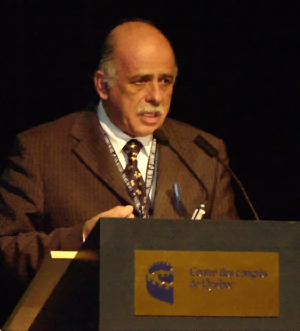
Jorge Malleux, WWF
Peru, discussed the present condition of dry-tropical forests. He reminded
that dry-tropical forests have been a cradle for many civilizations and
invited to look at the future of the forests bearing in mind experiences
of the past.
|
Temperate Forests:
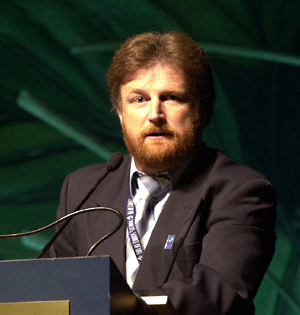 Peter
Csóka, General Director State Forest Service of
Hungary, opens the eco-regional roundtable on temperate forests, lining
out some specific challenges for SFM in these areas. Peter
Csóka, General Director State Forest Service of
Hungary, opens the eco-regional roundtable on temperate forests, lining
out some specific challenges for SFM in these areas.
|
|
|
|
Sub-tropical and tropical humid forests:
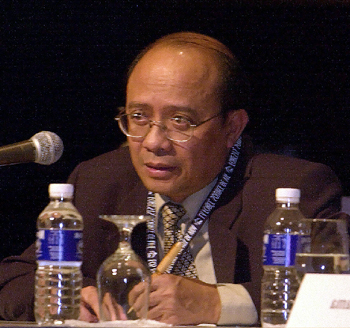
Boen Purnama, Ministry of Forestry Indonesia, highlighted direct
causes of deforestation in tropical and subtropical humid forest, noting
agriculture expansion, overgrazing and fuelwood gathering.
|
Boreal forests:
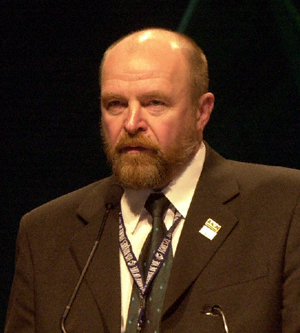
Victor Telplyakov, IUCN Russia, argued that
boreal forests lack international profile and are threatened by illegal
logging, climate change and radioactive contamination.
|
|
|
Open Fora on emerging
issues:
|
|
Participatory Management:
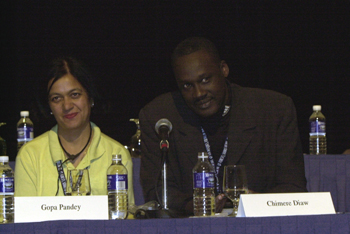
Gopa Pandey (left), Madhya Pradesh Forestry Department, and
Mariteuw Chimere Diaw (right), Center for International Forestry Research,
discuss how and to what extent states can be involved in participatory
management.
|
|
|
Sustainable
forest management:
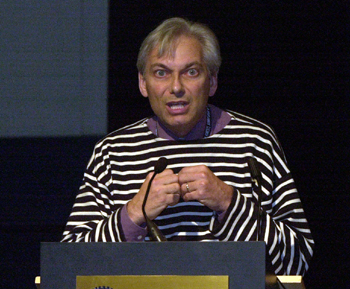
Luc Bouthillier, University of Laval, advocated partnerships with
forest peoples to ensure social and environmental viability of forest management.
|
|
|
Climate Change:
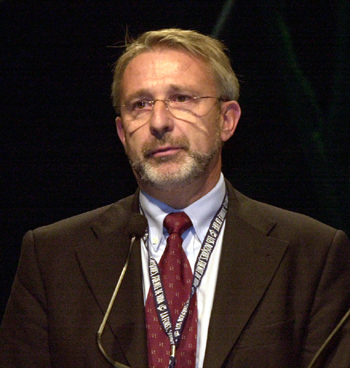
Ivar
Korsbakken, The Norwegian Forest Owners' Federation, calls for policies
that favor carbon recycling trough forest management and punish the
release of fossil carbon.
|
|
|
Biodiversity:
|
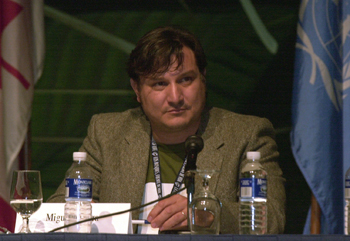
|
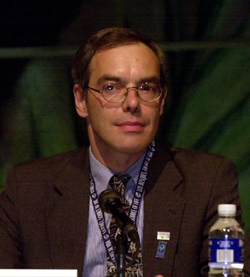
|

Above photo:
John Parotta (right) presented the benefits of plantations while Miguel
Lovera (left) described the disastrous effects of large scale monoculture
plantations.
|
|
|
Forest
and People in SIDS:
|
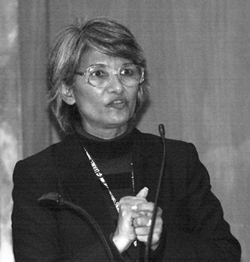
Angela Cropper presented a series of ideas to help small island developing
states (SIDS) implement the Barbados Programme of Action.
|
|
Sustainable Forest Management with a
Gender Perspective:
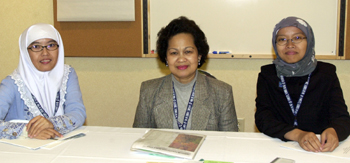
L-R: Ulfa Hidayati, The
Indonesian Institute for Forest and Environment, RMI, Hesti Wijaya,
Consortium of Indonesian Forestry with a Gender Equity Perspective, Abidah
Setyowati, Development in Managing Natural Resources, promote gender
equity in forest management by highlighting various villages of Indonesian
indigenous people .
|
|
| Development
of Wood Energy Systems for Poverty Reduction:
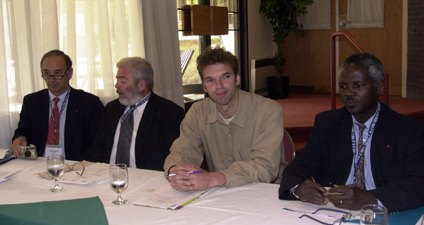
L-R:
Miguel Trossero, FAO , Peter Hall, Canadian Forest Services, André Faaij,
University of Utrecht and Sibi Bonfils, Institut for Energy and
Environment of Francophone Countries (IEPF), discuss the problems of fuel
wood management, recommending policy harmonization on the international
level.
|
|
|
|
|
|
|
|
Honourable Partners for the XII World Forestry Congress:
 Canada Government -
Natural Resources Canada.
Canada Government -
Natural Resources Canada.
 Gouvernement du Québec
– Ministère des Ressources naturelles, de la Faune et des Parcs.
Gouvernement du Québec
– Ministère des Ressources naturelles, de la Faune et des Parcs.
 FAO (Food and Agriculture
Organization of the United Nations).
FAO (Food and Agriculture
Organization of the United Nations).
 World Forestry Congress.
World Forestry Congress.
 Forest Products Association
of Canada.
Forest Products Association
of Canada.
 Sustainable Development's coverage of the XI World Forestry Congress.
Sustainable Development's coverage of the XI World Forestry Congress.
 Linkages
forests, desertification and land issues page, including a
brief introduction to global forest policy.
Linkages
forests, desertification and land issues page, including a
brief introduction to global forest policy.
|
Sustainable Developments home page | Linkages
home | IISDnet | E-mail
|
©
2003, IISD. All rights reserved.
|






















